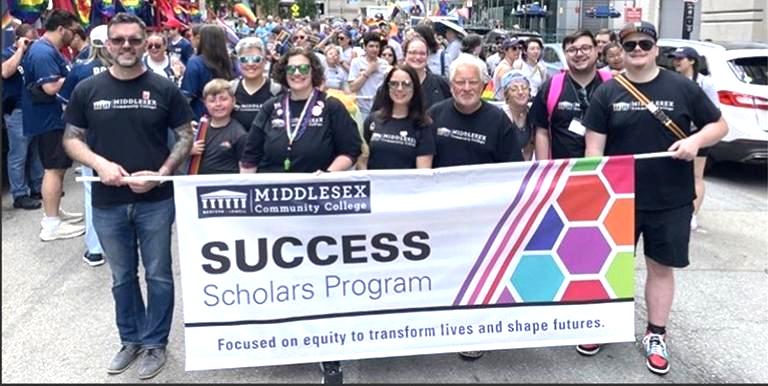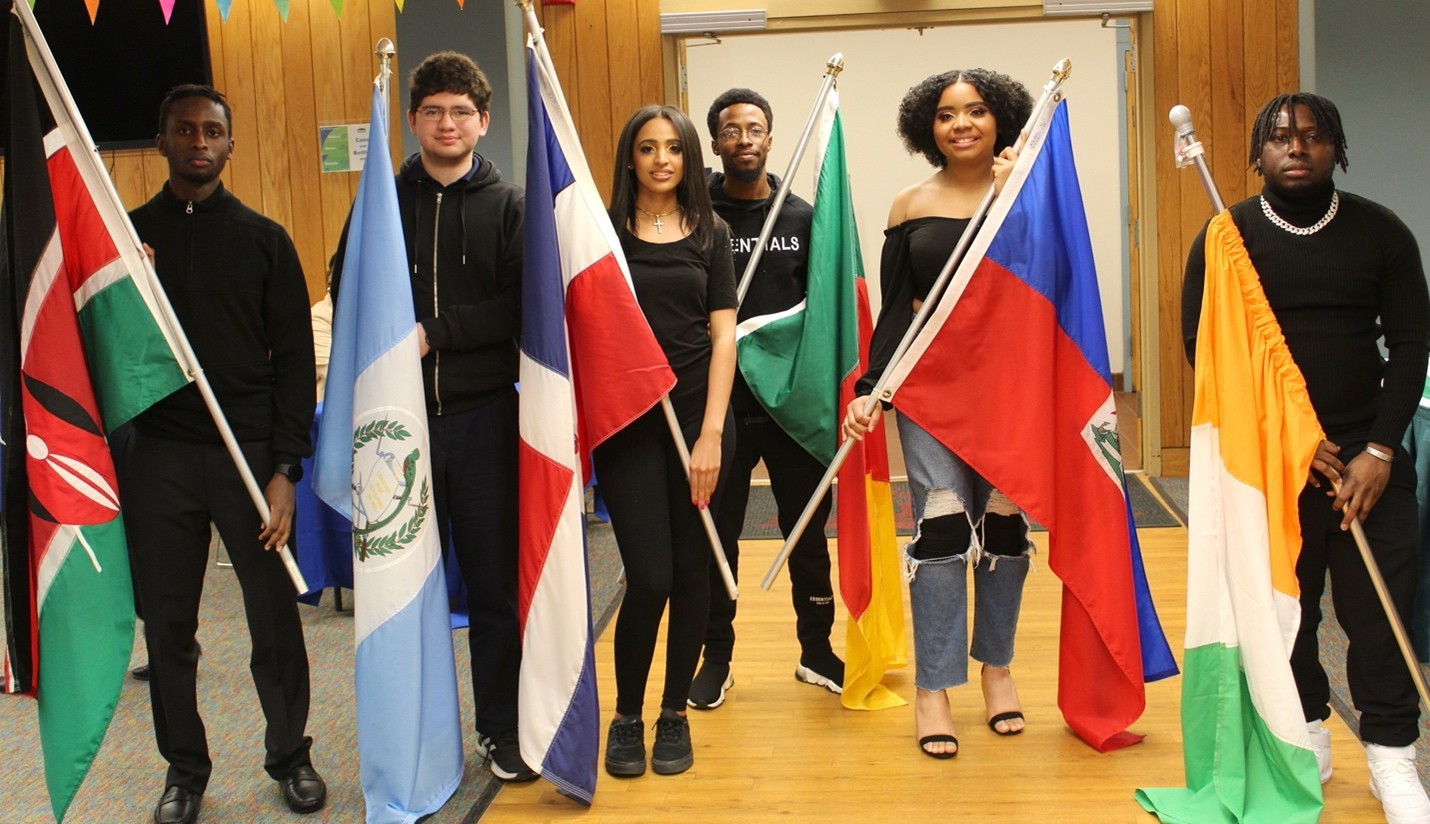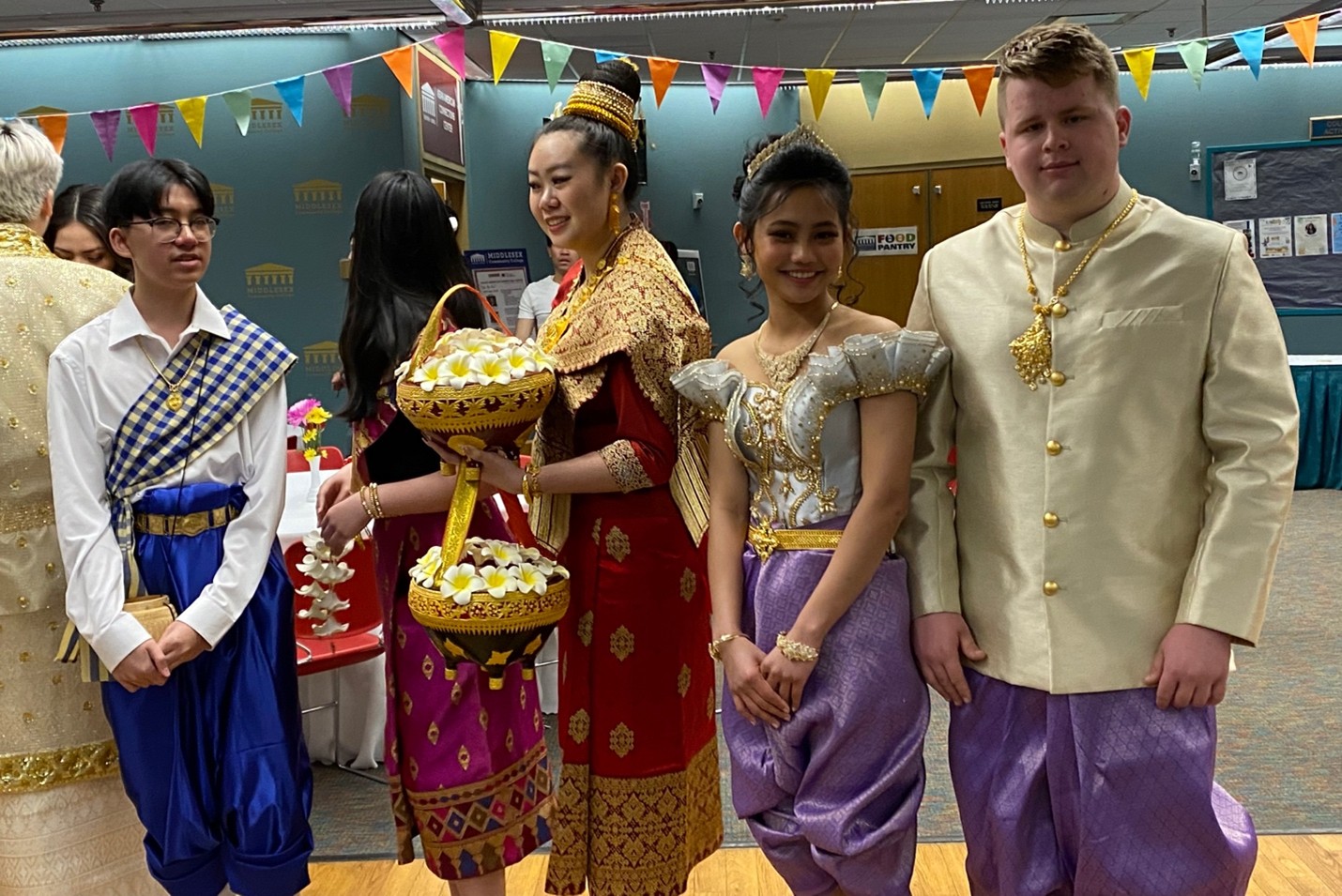Middlesex Community College: Centering Equity at Its Core

Middlesex Community College (MCC), with campuses in Bedford and Lowell, Massachusetts, has a longstanding mission of educational access and success for its diverse communities, but this commitment was deepened with the adoption of its 2022-2027 strategic plan: With Equity At Its Core. This plan outlines ambitious goals for addressing systemic and persistent disparities in educational outcomes by rooting work across the college in the equity agenda. Recognizing changing community demographics and the need to expand access to high-quality education to all, MCC made a bold move to embed equity as the foundational value for everything it does. By seeking to foster a welcoming and inclusive campus culture, the college aims to dismantle barriers to success; close institutional gaps; and ensure that all students, regardless of background, have the resources and support needed to thrive.
As a college serving students from a wide range of cultural, linguistic, and socioeconomic backgrounds, MCC has embraced the crucial importance of diversity, equity, and inclusion for achieving its mission. This article details how a combination of targeted programming, national partnerships, and a pragmatic approach to strategic plan implementation combined to promote an inclusive environment that not only meets the needs of previously underserved students, but also prepares them for success in their academic and professional journeys.
Targeted Programs to Achieve Equity
MCC’s student population reflects the diversity of surrounding communities. The student body is racially diverse, with 45 percent of students identifying as White, 19 percent Asian, 17 percent Hispanic/Latino, and 9 percent Black/African American. MCC is an Asian American and Native American Pacific Islander Serving (AANAPISI) institution, a Minority Serving Institution (MSI), and an Emerging Hispanic-Serving Institution (eHSI), with students representing no less than 116 different countries. In fact, Lowell is home to the second largest Cambodian community in the U.S. With growing Asian, Hispanic, and immigrant populations as well as many first-generation college students, MCC’s commitment to placing equity at its core has needed to be both culturally responsive and comprehensive. A focus on cultural responsiveness to create a sense of belonging has driven the creation of key programs tailored to specific student needs while supporting all students, no matter their backgrounds. Some examples include the SUCCESS Scholars Program, Program for Asian American Student Advancement (PAASA), and Intensive English Institute (IEI).

SUCCESS Scholars carry flags at the African Culture Club fashion show
SUCCESS Scholars Program
The SUCCESS Scholars Program, grounded in the TRIO model, supports students of color and LGBTQ+ populations by providing comprehensive mentoring and resources that address academic, financial, and personal wellness. Through targeted advising, coaching, peer mentoring, wellness initiatives, financial literacy workshops, and leadership development opportunities, the initiative aims to close retention gaps and foster community among student groups.
Program for Asian American Student Advancement
PAASA, funded through a federal AANAPISI grant, promotes student success by improving retention and fostering a sense of belonging among the college’s Asian American students. Offering personalized advising, mentoring, and leadership development, PAASA addresses educational barriers while promoting cultural competence among faculty, staff, and students. Through collaboration with community organizations, the program strengthens ties with local Asian American communities and aligns with MCC’s mission of equity and inclusion.

PAASA celebration of the Khmer New Year
Intensive English Institute
IEI was developed to meet the needs of non-native English speakers by providing immersive English instruction, strengthening readiness for college-level coursework, and building essential communication and academic skills. By focusing on academic English, IEI helps to bridge language gaps and provides students with knowledge and skills to participate fully in college life and reach their academic and professional goals.
National Partnerships to Fuel Institutional Transformation
In addition to providing targeted supports, much of the cultural transformation at MCC has been driven by the work of the Truth, Racial Healing, and Transformation Center. Funded by a grant from the American Association of Colleges and Universities (AAC&U), the center offers a space for racial healing circles and workshops, allowing for deep conversations that build cross-cultural understanding in a safe space. This work has also been fueled by multiple cohorts of faculty and staff actively engaging in the Pedagogy of Real Talk (PRT) professional learning program (Hernandez, 2015), an approach designed to build authentic connections with students, particularly those from marginalized backgrounds. PRT develops faculty and staff’s ability to provide genuine, empathetic interactions that resonate with students who might otherwise feel disconnected in a traditional college environment. These programs have been further bolstered by MCC’s involvement in the Achieving the Dream (ATD) network, a national effort to improve student success and close equity gaps that has kept the college laser focused on student outcomes through data-driven strategies and key performance indicators.
These initiatives and partnerships provide tailored support for students, delivering what they need, when they need it, and in ways that are understandable and welcoming. The college’s commitment to using data to inform decisions and assessing program effectiveness in an ongoing manner assures the continued improvement of equity initiatives to better serve students.
Making Change Through Strategic Doing
Key efforts have been implemented using the Strategic Doing framework developed at Purdue University (Morrison et al., 2019) that promotes collaboration across the college and continuous review of each strategic effort’s effectiveness. To ensure successful implementation of its equity-centered initiatives, MCC introduced the Strategic Leadership Council (SLC) and allocated $1.5M in fiscal year 2024, and $2M in fiscal year 2025 to fund projects supporting the strategic plan’s equity goals. Through forums called Critical Conversations, the college engages faculty, staff, and stakeholders in dialogues that align college practices with equity objectives and builds awareness and buy-in. These conversations are facilitated monthly to share data-driven equity goals, describe enrollment challenges, and advance facility planning.
The SLC, led by President Philip J. Sisson and his senior administrators, and with participation from faculty and staff from across the college, guides the implementation of MCC’s strategic plan, allowing the institution to build on successes and change course when necessary. This agile, collaborative approach has enabled MCC to address community needs promptly, adapt initiatives as challenges arise, and sustain momentum through continuous engagement with the college community.
Measurable Successes
The outcomes of these coordinated efforts have been impressive. For example, students in the SUCCESS Scholars Program in academic year 2023-2024 attempted more credit hours than their comparable peers. Over that same period, term-to-term persistence rates were also much better for SUCCESS Scholars (80 percent vs. 65 percent). Furthermore, data showed that increased connection to the program led to stronger outcomes. SUCCESS Scholars who had at least two interventions in fall 2023 had a higher credit load, better completion rate and GPA, and higher term-to-term persistence rate than students who had only a single intervention. All races and LGBTQ+ students had higher credit loads and better persistence rates than the degree/certificate seeking comparison group. Even more promising, SUCCESS Scholars who received academic support had extremely high completion rates of 90 percent in the fall and 81 percent in the spring.
Students engaged with the PAASA program in academic year 2023-2024 showed retention rates of 88 percent, significantly higher than their non-participating peers. The program has also done a great deal to engage the local community, from holding financial literacy workshops in Khmer to hosting cultural festivals. In fact, PAASA Program Director Virak Uy, along with Communication Department Chair Jennifer Bauer, collaborated to establish the Lowell Asian American Film Festival, now in its third year, to raise the visibility of Asian culture in the community. Through PAASA, the college held a series of traditional ceramics workshops using art as a form of healing that included University of Massachusetts Lowell and Lowell High School students; MCC faculty, staff, and students; and community members. PAASA also provided cultural competency workshops and cultural programming for the entire campus community, increasing student, staff, and faculty’s awareness of Asian cultural traditions and norms to inform their interactions.
IEI has been successful in providing non-native English speakers with immersive language instruction. With an intensive curriculum that builds reading, writing, speaking, and listening skills, IEI prepares students to succeed in college-level instruction. This has led to many successes, including Vanessa Huang from China who completed the IEI curriculum and enrolled in the MCC Accounting program, Rode Jephson Morancy from Haiti who enrolled in the MCC Nursing Program, and Carmela Santaniello from Italy who enrolled at Bunker Hill Community College, all in spring 2024. Not only are IEI students successfully entering a variety of academic programs, but Tiger Jin from China, who applied to the MCC Biotechnology program in fall 2024, will also serve as a tutor in IEI, and Changwoo Lee from South Korea completed IEI to become an adjunct professor in Economics at Brandeis University.
As indicated, the integration of targeted, equity-centered programs has yielded measurable improvements in student outcomes. MCC’s data-driven approach is illustrated most visibly in its Register, Integrate, Succeed, and Employed (RISE) key performance indicator metrics. RISE metrics are effectiveness measures aligned with the college's strategic plan that maximize the programs’ impact through continuous monitoring of progress. Additionally, efforts have been fueled by partnerships with national organizations such as ATD and AAC&U that provide frameworks, guidelines, connections to a wider community of practice, and, most importantly, accountability. The reflective nature of the Pedagogy of Real Talk is reshaping how we deliver curricula and services from a deficit mindset to approaches based on students’ many assets and cultural capital (Yasso, 2005). And all this work is financially supported and coordinated through the SLC and the Strategic Doing process.
Lessons Learned and Recommendations
MCC’s commitment to equity offers valuable lessons for building inclusive educational environments. Maintaining faculty and staff engagement in equity initiatives has been essential to ongoing success, as has been integrating flexibility to meet the evolving needs of a diverse student population. Programs may need to change as they develop and grow and as institutions evolve as student-ready colleges (McNair et al., 2022). Our experiences have taught us the importance of developing comprehensive, culturally responsive support systems that foster student engagement and success and include the members of the many communities that we serve. We have learned that institutions benefit from being data informed as they implement programs targeting underserved student populations with academic and personal resources to help them succeed.
Sustaining Momentum in Times of Change
MCC’s commitment to centering equity at the core of its institutional mission demonstrates how intentional, equity-focused practices can drive transformative change in student outcomes. By integrating culturally responsive programs like SUCCESS, PAASA, and IEI, alongside innovative national frameworks such as ATD and the Pedagogy of Real Talk, MCC has built a model for creating inclusive environments that empowers students from all backgrounds to succeed.
We recognize that regulatory and cultural landscapes surrounding equity differ significantly from state to state, and that changing federal priorities may also influence how colleges need to approach equity work. However, regardless of terminology or specific strategies, the focus must remain on data-driven initiatives rooted in a deep understanding of each college’s student population and the communities it serves. This alignment with the mission of community colleges—providing education that meets local needs—ensures that equity efforts are relevant, actionable, and impactful.
As MCC continues to develop its equity initiatives, its journey may serve as an example for others. By adapting services and programming to local contexts and maintaining a steadfast commitment to understanding and addressing the unique barriers our students face, institutions across the country can adopt equity-focused practices that improve student outcomes and foster inclusive, supportive learning environments in a variety of ways.
References
Hernandez, P. (2015). The pedagogy of real talk: Engaging, teaching, and connecting with students at risk. Corwin.
McNair, T. B., Albertine, S., McDonald, N., Major, T., Jr., & Cooper, M. A. (2022). Becoming a student-ready college: A new culture of leadership for student success (2nd ed.). Jossey-Bass.
Morrison, E., Hutcheson, S., Nilsen, E., Fadden, J., & Franklin, N. (2019). Strategic doing: Ten skills for agile leadership. Wiley.
Yosso, T. J. (2005). Whose culture has capital? A critical race theory discussion of community cultural wealth. Race Ethnicity and Education, 8(1), 69-91
Lead image: President Sisson, staff, and faculty march at the Boston Pride parade
Philip J. Sisson is President; Arlene Rodríguez is Provost and Vice President, Academic and Student Affairs; Matthew Olson is Associate Provost, Academic Affairs and Strategic Initiatives; and Noreen McGinness Olson is Assistant Dean, Student Success, at Middlesex Community College in Massachusetts.
Opinions expressed in Leadership Abstracts are those of the author(s) and do not necessarily reflect those of the League for Innovation in the Community College.










